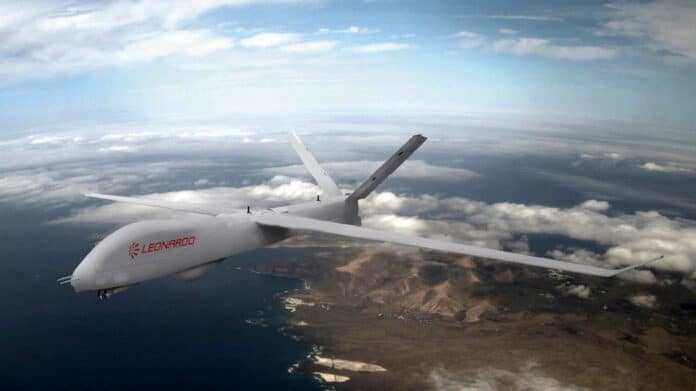Italy-based Leonardo has successfully completed the first phase of flight testing for its Falco Xplorer drone.
The flight testing of the Falco Xplorer took place at the Trapani Birgi military airport in Sicily, Italy, with the support of the Italian Air Force’s 37 Stormo wing. During the flight tests, 37 Stormo provided all essential airport services, including air traffic assistance, fire prevention, and flight safety measures.
The advanced military drone performed all planned flights on schedule and completed a range of complex functional tests, confirming the maturity of the platform. The team also validated the behavior of the aircraft in a number of phases of the flight envelope.
The Falco Xplorer is the first aircraft in the MALE-class (Medium Altitude Long-Endurance) uncrewed system to exclusively use European technology. The aircraft is also the largest uncrewed aircraft produced by Leonardo, with an 18.8-meter (61.6ft) wingspan and 1.3-tonne maximum take-off weight. It can stay aloft for up to 24 hours.
The Xplorer is designed to deliver persistent surveillance over wide areas of interest and can carry multiple sensors weighing up to 350kg.
Made entirely in-house, the Xplorer’s sensor suite consists of the company’s LEOSS electro-optical turret, Gabbiano TS-80 UL multimode radar, an Automatic Identification System for the monitoring of maritime traffic, and the SAGE electronic intelligence system. In addition, the Falco Xplorer utilizes Leonardo’s flexible ATOS mission system, which has an open architecture to allow for the integration of additional sensors, including from third parties.
The system is now ready for the second phase of the campaign, which will lead to the certification of the company’s largest UAV. The second test campaign will take place under the supervision of the Directorate for Aeronautical Armaments and Airworthiness (DAAA). This will certify the Falco Xplorer’s ‘fitness to fly’ according to NATO standards and involve a series of increasingly complex flights.
The system’s most advanced capabilities will be validated, together with the military authority, including automatic take-off and landing and satellite communications for beyond-line-of-sight operations. Its sensor suite will also be assessed.
Ultimately, the certification will enable the Falco Xplorer to fly over populated areas, significantly expanding its scope and allowing it to operate in support of public safety and civil protection missions.
